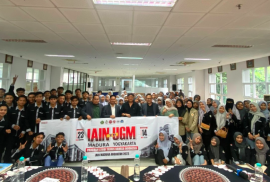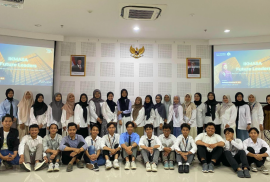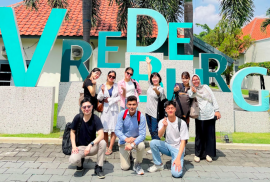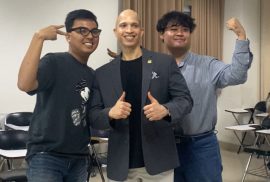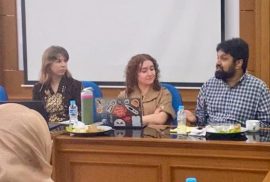Yogyakarta, May 14, 2025 — As part of an effort to broaden academic perspectives, the Tadris Bahasa Indonesia Study Program at IAIN Madura conducted an academic visit (Studi Wawasan) to the Master in Literature Program, Faculty of Cultural Sciences, Universitas Gadjah Mada. Held on Wednesday, May 14, 2025, at the L1 Seminar Room of the UGM Library and Archives Building, the event was attended by over 70 undergraduate students from IAIN Madura along with their faculty supervisors.
The main agenda of the event included an introduction to UGM, an overview of the Master of Literature curriculum and student activities, insights into academic life on campus, and a Q&A session discussing admissions and scholarships available for postgraduate study.
In his opening remarks and presentation, Prof. Dr. Aprinus Salam, M.Hum., Head of the Master in Literature Program of Universitas Gadjah Mada, emphasized that the program not only offers academic learning in the classroom but also a variety of enrichment activities to support student development.
Meanwhile, Agus Purnomo Ahmad Putikadyanto, M.Pd., Head of the Tadris Bahasa Indonesia Program of IAIN Madura, expressed his hope that the visit would broaden students’ horizons and encourage them to pursue deeper academic engagement.
“We hope our students can learn and gain new insights into further education, so they are motivated to expand their knowledge even more,” he stated.
The Q&A session became one of the most engaging parts of the event. Nada Nadillah, a current student of the Master in Literature Program and recipient of the LPDP scholarship, shared her experience in obtaining the scholarship. She explained the application process, selection stages, and required documents in detail.
“There are various types of LPDP scholarships, such as regular and affirmative. The selection process includes administrative screening, a scholastic test, and a substantive interview. Requirements include a TOEFL score, academic transcript, and a study plan,” Nada explained in response to one of the participants’ questions.
Marisa Santi Dewi, an alumna of the Master in Literature Program at UGM, addressed a question about the difficulty level of gaining admission to a master’s program. She emphasized that the selection process is manageable if students prepare well in advance.
“Getting into the Master’s program is quite easy, actually. You just need a TOEFL score, a TPA test result, and your transcript. You can start preparing now—especially since you’re still in your fourth semester,” Marisa encouraged.
This academic visit served as a valuable platform for the exchange of knowledge and experiences between the two institutions. It aimed not only to provide insight into postgraduate education but also to inspire students from IAIN Madura to continue developing themselves academically. In addition to presenting information on curriculum structure, admissions pathways, and available scholarships, the event featured warm and interactive discussions with current students and alumni of the Master of Literature Program, enriching participants’ perspectives. As such, the visit was not only informative but also motivational, fostering greater readiness among students to pursue higher education in the future.
[Public Relation Master of Literature, Marsya Kamila]

